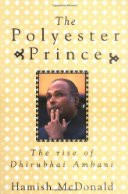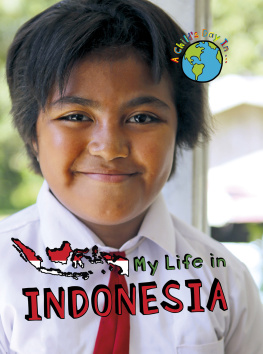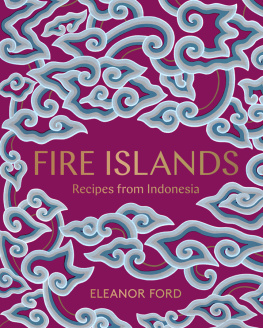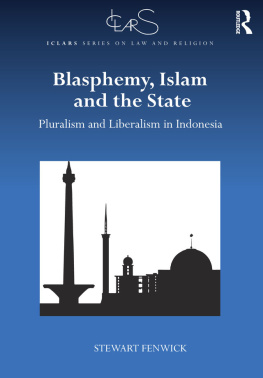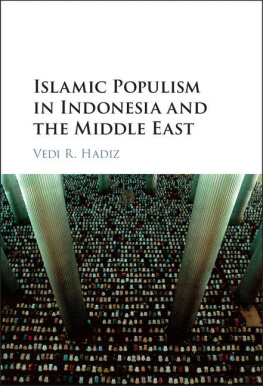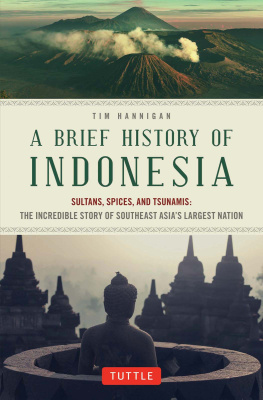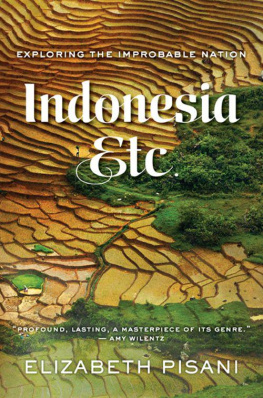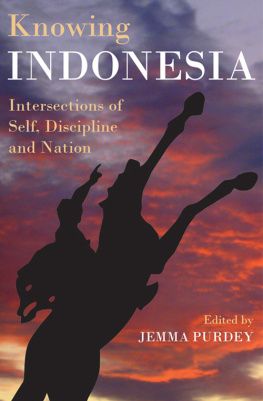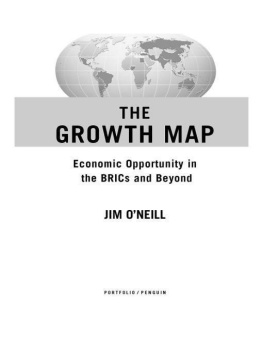Demokrasi
Indonesia in the 21 st Century
Hamish McDonald

The author and publisher have provided this e-book to you for your personal use only. You may not make this e-book publicly available in any way. Copyright infringement is against the law. If you believe the copy of this e-book you are reading infringes on the authors copyright, please notify the publisher at: us.macmillanusa.com/piracy .
untuk Tukiyem, Heri,
Yon dan Fitri
Contents
Authors Note
This book is intended as a quick overview of contemporary Indonesia and, in some aspects, has been streamlined for ease of reading. In most cases, Indonesian names are rendered in standard modern spellings, even when their owners prefer the older Dutch-era renditions. Notably, the tj consonant becomes c, and the oe vowel becomes u. Monetary amounts are given in the US dollar equivalent at the exchange rate of the time, though at times of wild fluctuationssuch as in 19978this can produce wide variations. Again for ease of reading, attribution to sources is given in the text where possible, rather than in footnotes. Where the US embassy or its officials are cited as sources, the material has been drawn from the vast cache of US diplomatic reports published by WikiLeaks in 201011.
Abbreviations
ABRIAngkatan Bersenjata Republik Indonesia (Armed Forces of the Republic of Indonesia)
BappenasBadan Perencanaan Pembangunan Nasional (National Development Planning Agency)
BINBadan Inteligen Negara (State Intelligence Agency)
BNPTBadan Nasional Penanggulangan Terrorisme (National Counterterrorism Agency)
BrimobBrigade Mobil (Mobile Brigade, Indonesian National Police)
DAPDewan Adat Papua (Papua Traditional Council)
DPRDewan Perwakilan Rakyat (Peoples Representative Council)
FPIFront Pembela Islam (Islamic Defenders Front)
GAMGerakan Aceh Merdeka (Free Aceh Movement)
GerindraGerakan Indonesia Raya (Great Indonesia Movement)
GolkarPartai Golongan Karya (Party of the Functional Groups)
IBRAIndonesian Bank Restructuring Agency
ICMIIkatan Cendekiawan Muslim Indonesia (Indonesian Association of Muslim Intellectuals)
KKN Korupsi, Kolusi, Nepotisme (Corruption, Collusion, Nepotism)
KNILKoninklijk Nederlands Indisch Leger (Royal Netherlands Indies Army)
KNIPKomite Nasional Indonesia Pusat (Central Indonesian National Committee)
KNPBKomite Nasional Papua Barat (National Committee for West Papua)
KomnasHAMKomisi Nasional Hak Asasi Manusia (National Commission on Human Rights)
KompakKomite Aksi Penanggulangan Akibat Krisis (Crisis Management/Prevention Committee)
KopassusKomando Pasukan Khusus (Special Forces Command)
KopkamtibKomando Operasi Pemulihan Keamanan dan Ketertiban (Operational Command for the Restoration of Security and Order)
KosgoroKesatuan Organisasi Serbaguna Gotong Royong (Federation of Miscellaneous Mutual-Aid Organizations)
KostradKomando Cadangan Strategis Angkatan Darat (Army Strategic Reserve Command)
KPCKaltim Prima Coal
KPKKomisi Pemberantasan Korupsi (Corruption Eradication Commission)
MalariMalapetaka Januari (January Calamity)
MasyumiMajelis Syuro Muslimin Indonesia (Council of Indonesian Muslim Associations)
MPRMajelis Permusyawaratan Rakyat (Peoples Consultative Assembly)
MubesMusyawarah Besar (Grand Consultation)
MUIMajelis Ulama Indonesia (Indonesian Ulemas Council)
Nasakom Nasionalisme, Agama, Komunisme (Nationalism, Religion, Communism)
NHMNederlandsche HandelMaatschappij (Netherlands Trading Company)
NUNahdatul Ulama (Muslim Scholars League)
OPECOrganization of the Petroleum Exporting Countries
OPMOrganisasi Papua Merdeka (Free Papua Movement)
Opsus Operasi Khusus (Special Operations)
Otsus Otonomi Khusus (Special Autonomy)
PANPartai Amanat Nasional (National Mandate Party)
ParmusiPartai Muslimin Indonesia (Indonesian Muslim Party)
PDPartai Demokrat (Democratic Party)
PDIPPartai Demokrasi IndonesiaPerjuangan (Democratic Party of IndonesiaStruggle)
PDIPartai Demokrasi Indonesia (Indonesian Democratic Party)
PermestaPiagam Perjuangan Semesta (Universal Struggle Charter)
PETAPembela Tanah Air (Defenders of the Homeland)
PKBPartai Kebangkitan Bangsa (National Awakening Party)
PKIPartai Kommunis Indonesia (Communist Party of Indonesia)
PKSPartai Keadilan Sejahtera (Prosperous Justice Party)
PNDPartai Nasional Demokrat (National Democrat Party)
PNIPartai Nasional Indonesia (Indonesian National Party)
PPPPartai Persatuan Pembangunan (Development Unity Party)
PRRIPemerintah Revolusioner Republik Indonesia (Revolutionary Government of the Indonesian Republic)
PSIPartai Sosialis Indonesia (Socialist Party of Indonesia)
REDD+Reducing Emissions from Deforestation and Forest Degradation
SBYSusilo Bambang Yudhoyono
TAVIP Tahun Vivere Pericoloso (the Year of Living Dangerously)
TNITentara Nasional Indonesia (Indonesian National Army)
VOCVereenigde Oost-Indische Compagnie (United East Indies Company)
Introduction
I am enchanted with these islands! exclaims the main character in Joseph Conrads novel Victory, set in the East Indies at the start of the last century. Many other foreign visitors continue to find magic in the Indonesian archipelago, which spreads as wide as the United States along the equator in Southeast Asia.
For this writer and others, it was a romantic place to start a career as a foreign correspondent. Though the islands had been explored, occupied, and exploited by the West for centuries, the newly emerged Indonesia was somehow outside the worlds mainstream. It had an aura of beauty, sensuality, chaos, and violence. Those who came and stayed saw the possibility of a great but gentle nation arising here; one retiring American ambassador titled his book about Indonesia The Possible Dream.
In the late 1970s, Jakarta was a city of intermittent electricity, frequent flooding, prohibitive rents (thanks to an oil boom), limited telephones, and taciturn officials. Yet our small house, which was off an alleyway called Gang Sekayu, was surrounded by a welcoming community. Neighbors watched over our small child. The family of the respected hajji (a returned pilgrim to Mecca) welcomed her to Muslim ceremonies and exhibitions of silat (martial arts). A housekeeper from Kediri, in East Java, became like a second mother. This womans hometown became my case study of grassroots politics: there I met a former military commander and a venerated kyai (an Islamic scholar), who together had wiped out the local communists a decade earlier and who were now political enemies in the highly controlled New Order regime.
Indonesia had changed, old hands said. Yet it was still possible to call at the home of the president at the end of the fasting month and shake Suhartos hand. Nonetheless, my journalistic sins mounted up in the black book kept at the Ministry of Information. After three and a half years, further visa extensions were refused. I wrote a book, Suhartos Indonesia, which for some years became a primer on the country. A decade as persona non grata followed.
A conciliatory foreign minister, Ali Alatas, persuaded the system to relax, and in 1989 I resumed making short visits to a rapidly changing country. My book by now was out of date. At last Suharto was pushed from power in the financial crisis of 19978, in an almost unbelievable repudiation of what had seemed an unbreakable system. Then, in Dili, the violent side of Indonesia emerged. Back in Jakarta, we journalists waited long into the evening at the presidential palace; near midnight, the small figure of B. J. Habibie, Suhartos successor, announced the end of thirty-four years of occupation in East Timor. When I saw the grim faces of the army generals around him, it seemed impossible that this experiment with democracy would be allowed to continue. Yet it has.
Next page


